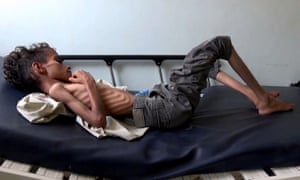The Saudi-led coalition has deliberately targeted civilians. The UK must press for answers – not be complicit in a cover-up

The Saudi-led coalition has, from the very start of the conflict in 2015, sought to use starvation as a weapon of war.’ Photograph: Marzooq Al-Jabiry/AFP/Getty Images
https://www.theguardian.com/commentisfree/2018/nov/22/famine-yemen-war-crime-civilians-saudi-coalition
Emily Thornberry - Shadow secretary of state for foreign and Commonwealth affairs
Today the UN security council will debate a UK-drafted resolution containing a rather gentle entreaty to the warring parties in Yemen. It will ask them to take “constant care to spare civilian objects, including those necessary for food production, distribution, processing and storage”.
If that sounds like the safety instructions for a new vacuum cleaner, then welcome to the world of UN resolutions. But what it actually reveals is a far darker, more shameful truth. The truth of a Saudi-led coalition, armed by Britain and the United States, which from the very start of the conflict in 2015 has sought to use starvation as a weapon of war.
Most obviously, their on-off blockades of any ports and airports controlled by the Houthi rebels have drastically cut supplies of food to a Yemeni population that relies on imports to eat. But far more insidiously, and in the absence of imports, the Saudi air force has systematically and deliberately destroyed the domestic means of producing and distributing food inside Yemen. Their bombs have constantly targeted agricultural land, dairy farms, food processing factories, and the markets where food is sold.
And when I’ve asked even the most craven apologists for the Saudi regime what possible reason there would be for targeting these sites – fields of crops and village wells – they just shrug their shoulders and say: “Sometimes mistakes are made.”
But these are no mistakes. These are medieval tactics with modern weapons deliberately employed by the architect of the Yemen war – Crown Prince Mohammed bin Salman – in an attempt to bring the rebel-held areas of the country to their knees. He could not care less about the impact on Yemen’s civilian population, any more than he cared about what happened to Jamal Khashoggi.
But we have a responsibility to care, not least because Britain is one of the leading exporters of the planes and weapons with which Saudi Arabia has enforced its blockades, and destroyed Yemen’s food infrastructure.
So now is the time to act. It may be too late for the minimum of 85,000 children who are estimated to have died from malnutrition and disease since the war in Yemen began, in addition to the several hundred killed by Saudi air strikes. But it is not too late for the five million Yemeni children whom the United Nations has warned are on the brink of starvation, thanks to the man-made, and Saudi-induced famine that is currently gripping the country.
We must secure an immediate cessation of hostilities in Yemen, particularly around the key port and battleground of Hodeidah, and the full, unhindered opening of access for humanitarian relief for the Yemeni civilians who desperately need it.
That must be the priority, but I also believe we need accountability for the states and individuals that have caused this crisis, brought us to the brink of a famine that the UN says would be the worst in the past 100 years, and – by using starvation as a weapon of war – are in clear breach of international humanitarian law.
There is one man above all who bears that responsibility, and one man who must be held to account: the crown prince of Saudi Arabia. And yet, when I asked Jeremy Hunt yesterday in parliament why the resolution that will go before the security council today did not mention the need for an investigation of all alleged war crimes, and full accountability for those responsible, and whether the crown prince had insisted on the removal of that demand, he did not answer.
If that is what happened, it should be a national disgrace, because it does not just make our country complicit in protecting the reputation of the crown prince, but in covering up the terrible toll of starvation that he has inflicted on the children of Yemen.
Emily Thornberry is shadow secretary of state for foreign and Commonwealth affairs
https://www.theguardian.com/commentisfree/2018/nov/22/famine-yemen-war-crime-civilians-saudi-coalition






1 Comments
501A9E369A
ReplyDeletekiralık hacker
hacker arıyorum
kiralık hacker
hacker arıyorum
belek